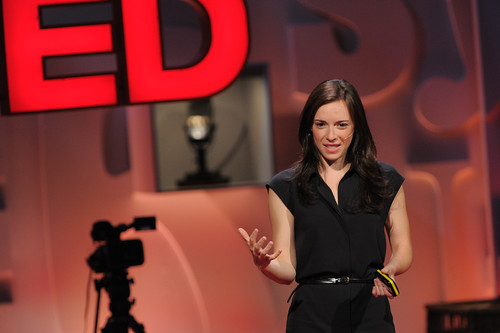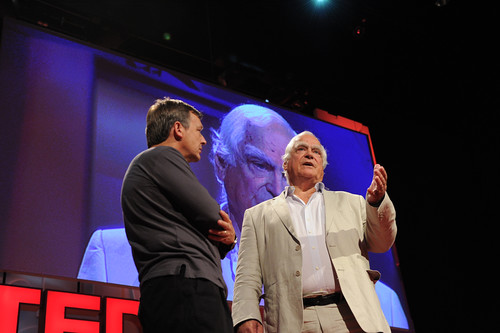TEDGlobal 2010 day 4 session 8 : Adventures In Fairness
Another great session at TEDGlobal this year. Tim Jackson wondered if our choice was to “Crash the system or trash the planet?”. Where to look for hope in front of the maths that seem to make us hit the wall in a few decades? Is 2% annual GDP growth sustainable? How deep is the human need for novelty? Does it makes us happy? He showed a few ideas that could change how we could continue to prosper within the limits of a finite planet. Demoed ecosia, a search engine that saves 2 square meters of rainforest for each search. Sustainability doesn’t mean we have to go back to the caves : investment can be a solution.
 Jessica
Jackley is the charming cofounder of Kiva,
the microlending champion. She described her journey over the years,
from her education to donate to poor people, to her life-changing
encounter with professor
Yunus after which she went
to Africa to meet $100 entrepreneurs who actually taught her a lot
about finance (at the time I didn’t even know the difference between
revenue and profit). This experience would lead to the creation of Kiva
with her partner Matt, the rest is history. Kiva is now lending $100M+
a year which is ridiculously impressive. Other impressive sidenote she
didn’t mention on stage: PayPal has granted free transaction fees to
Kiva. Never satisified, Jessica is now launching
profounder which I understood to be a Friends
& Family fundraising platform. The end of the talk was very emotional
and visibly overwhelmed she said that more that everything else, it is
believing in each other that will make tomorrow better than today.
Jessica is a very talented and impressive individual: she really made a
sizable contribution to the world and yet she remains easy-going and
very humble. As I learned at my delight when talking to her afterwards,
she also speaks some french! Good news for TEDx PARIS
2011 attendees? Can’t say more ;-)
Jessica
Jackley is the charming cofounder of Kiva,
the microlending champion. She described her journey over the years,
from her education to donate to poor people, to her life-changing
encounter with professor
Yunus after which she went
to Africa to meet $100 entrepreneurs who actually taught her a lot
about finance (at the time I didn’t even know the difference between
revenue and profit). This experience would lead to the creation of Kiva
with her partner Matt, the rest is history. Kiva is now lending $100M+
a year which is ridiculously impressive. Other impressive sidenote she
didn’t mention on stage: PayPal has granted free transaction fees to
Kiva. Never satisified, Jessica is now launching
profounder which I understood to be a Friends
& Family fundraising platform. The end of the talk was very emotional
and visibly overwhelmed she said that more that everything else, it is
believing in each other that will make tomorrow better than today.
Jessica is a very talented and impressive individual: she really made a
sizable contribution to the world and yet she remains easy-going and
very humble. As I learned at my delight when talking to her afterwards,
she also speaks some french! Good news for TEDx PARIS
2011 attendees? Can’t say more ;-)
Next talk from Auret Van Heerden also stuck me. He talked about the “contamination” of most consumer supply chains by slaves, corruption, and catastrophic landfills at their end. The fact that this supply chain has gone global in the last decades makes its inspection a very hard problem because governments, most of the time corrupted in these countries, just don’t care for global good. And when they’re not corrupted they’re just overwhelmed by the daunting size of the task. He then proceeded to explain how we can fix this broken system by using private contracts to ensure the quality of the whole supply chain. It’s much more efficient for one big company to impose strict standards to its suppliers than to work with tens of government agencies along the chain. He’s envisioning the beginning of a new way of regulation and human rights enforcement, using the power of our biggest private companies. Being a self-confessed cold cartesian, I like this approach very much because with a single intelligent strike it leads to huge, world-changing results. Repeat with the next bigco and within years every supplier will be forced by the market to be clean.
 Finally
Peter Eigen was
introduced with great praise by Chris. He’s the founder of Transparency
International. He talked about geopolitics
and how it’s almost expected that in a such competitive global economy,
some governments will fail. He estimates the sustained bribe economy
worldwide to reach 1 trillion dollars each year. One. Trillion. Dollars.
However good news may be that the time of the civilian society has
finally arrived. His fight against corruption has led him to bring
together NGOs, companies and governments to the table. Very impressive.
Finally
Peter Eigen was
introduced with great praise by Chris. He’s the founder of Transparency
International. He talked about geopolitics
and how it’s almost expected that in a such competitive global economy,
some governments will fail. He estimates the sustained bribe economy
worldwide to reach 1 trillion dollars each year. One. Trillion. Dollars.
However good news may be that the time of the civilian society has
finally arrived. His fight against corruption has led him to bring
together NGOs, companies and governments to the table. Very impressive.